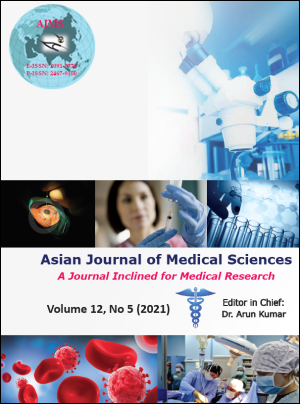Reassessing the population based Seroprevalence for IgG antibodies against SARS COV2 in Ahmedabad
Keywords:
SARS-COV2, Covid-19, Sero-surveillance, Immunity, IgG AntibodyAbstract
Background: Assessing population based seroprevalence can help in monitor the pandemic, and suggest appropriate corrective public health measures.
Aims and Objectives: To study seroprevalence of IgG antibodies against SARS-CoV2 to understand the pandemic status and deriving valid conclusions for guiding the public health measures for managing the covid19 pandemic.
Materials and Methods: A serosurveillance study was carried out using population based stratified sampling for the general population of Ahmedabad city. Seroprevalence for Cases, Contacts and Health Care Workers (HCWs) was also estimated as separate additional categories. The seroprevalence was compared with various demographic factors for valid and precise predictions regarding the immunity status of the population.
Results: As on October 2020, the seroprevalence for IgG antibodies against SARS-CoV2 in the general population of Ahmedabad is 24.20% (95% Confidence Interval 23.57%–24.85%) The sero-positivity has increasing trend with age and is higher among females (24.83%) than males (23.72%) but is statistically not significant. The zone wise positivity ranged from 18.70% to 33.52%. The seropositivity among HCWs, contacts and cases are 20.84%, 26.05% and 54.51% respectively and it closely correlate with the risk.
Conclusion: As on October 2020, general population demonstrate a seropositivity of 24.20%. The seropositivity among various groups is according to the risk of contracting the disease. Results also indicate the possibility of undetectable level or disappearing IgG during the post-covid period. Results also indicate that the preventive measures must be strongly followed for continued control of the pandemic situation till an effective vaccine is provided to the people at large.
Downloads
Downloads
Published
How to Cite
Issue
Section
License
Authors who publish with this journal agree to the following terms:
- The journal holds copyright and publishes the work under a Creative Commons CC-BY-NC license that permits use, distribution and reprduction in any medium, provided the original work is properly cited and is not used for commercial purposes. The journal should be recognised as the original publisher of this work.
- Authors are able to enter into separate, additional contractual arrangements for the non-exclusive distribution of the journal's published version of the work (e.g., post it to an institutional repository or publish it in a book), with an acknowledgement of its initial publication in this journal.
- Authors are permitted and encouraged to post their work online (e.g., in institutional repositories or on their website) prior to and during the submission process, as it can lead to productive exchanges, as well as earlier and greater citation of published work (See The Effect of Open Access).




